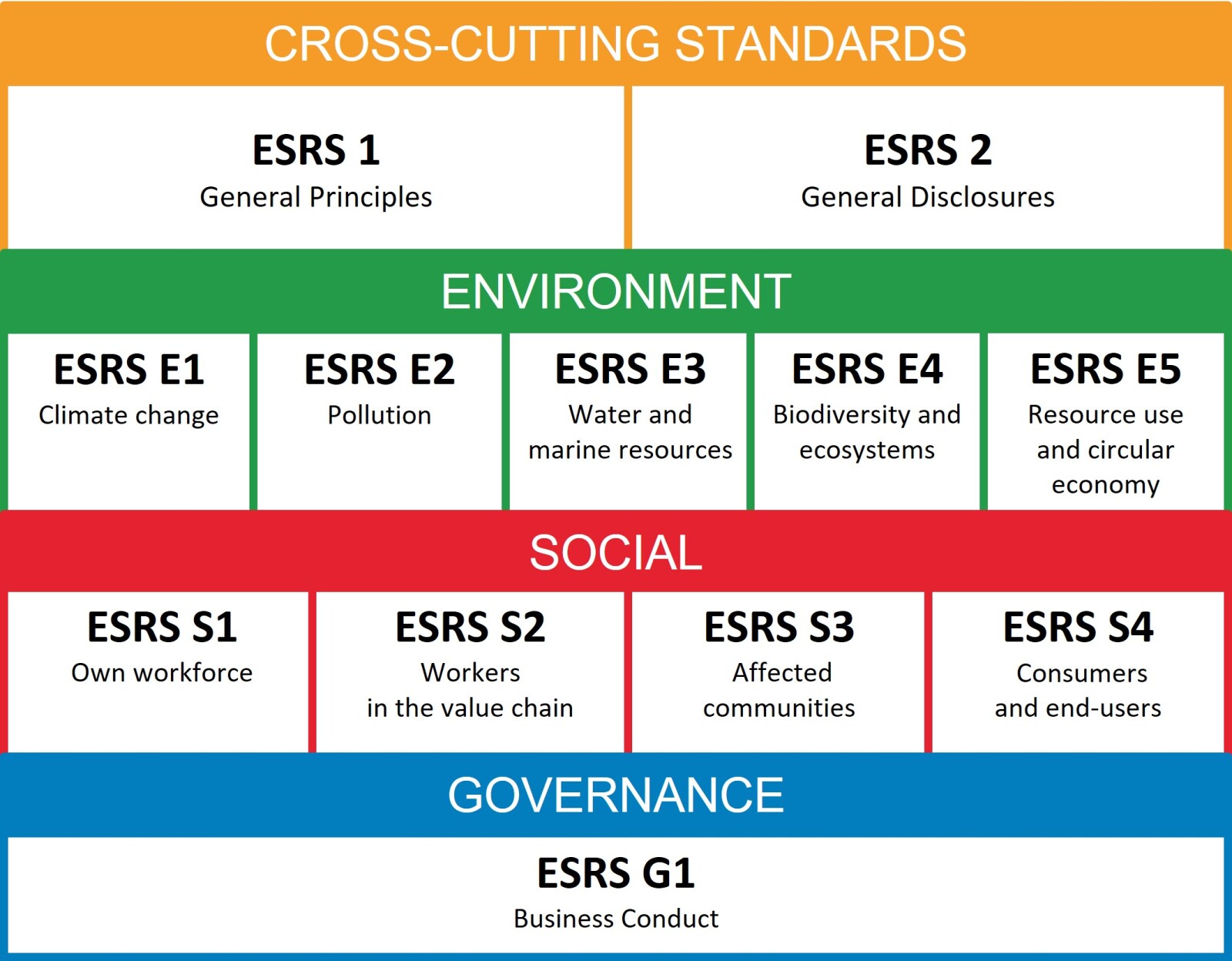First set of standards submitted for final approval to the EU commission

On November 22, 2022, EFRAG submitted the first set of standards to the European Commission for final approval. The European Sustainability Reporting Standards (ESRS) are the concrete implementation of the Corporate Sustainability Reporting Standard (CSRD), the legal instrument.
The architecture of the ESRS is shown visually below.

Changes in response to the consultation
Compared to the set that was offered for consultation, a number of significant changes have been made in response to the consultation:
1. More alignment with existing international standards
The final set has a greater degree of alignment with the standards of the International Sustainability Standards Board (ISSB), the Global Reporting Initiative (GRI), and expectations regarding due diligence as described in international instruments such as the UN Guiding Principles on Business and Human Rights (UNGP) and the OECD Guidelines for Multinational Enterprises. In 2021, GRI already aligned all its standards with these instruments. Alignment with the Minimum Safeguards from the EU Taxonomy and SFDR has also been sought.
2. A more central role for the materiality analysis of the reporting organization
Many responses were received regarding the so-called "rebuttable presumption". This presumption meant that in principle, all standards were deemed material for every organization. This assumption has been abandoned in this version of the standards. Some standards and disclosures are mandatory for everyone. These include ESRS 1 and 2, E1 Climate, and S1 Own workers to some extent. The obligation to report for the other standards (1 to E5, S2 to S4, and G1) and disclosures follows from the double materiality assessment that the organization itself must perform.
3. A significant reduction in the number of disclosures
In the final standard that was submitted, the number of disclosures has been reduced by approximately half to 84 (1144 data points). In addition, the number of disclosures in the various standards has been reduced: • A large number of disclosure requirements have been removed, some of which may return in the sector-specific standards that EFRAG is currently developing. • For many reporting requirements, a gradual implementation applies. This means that some reporting requirements only need to be reported 1, 2, or 3 years after the standard actually comes into effect. • Reporting requirements that require data from value chain partners are not mandatory in the first 3 years; during this period, reporting organizations may suffice with in-house data. This does not apply to situations where value chain data is required to comply with other EU legislation.
Getting started with CSRD and ESRS
To get started with CSRD/ESRS, it is first important to determine when your organization is required to report in accordance with ESRS and then assess where you currently stand. Based on the gap between the desired situation and the current situation, a roadmap can be developed.
Type of Organization CSRD obligation per Concerns annual report that appears in Large, listed, or OOB January 1, 2024 2025 (for reporting year 2024) Other large companies January 1, 2025 2025 (for reporting year 2024) SME January 1, 2026 2027 (for reporting year 2026)
Action plan
We recommend going through the following steps to create a detailed roadmap:
Step 1: Create awareness and knowledge within the organization
Step 2: Map the current situation
Step 3: Create an initial roadmap
Step 4: Perform a double materiality analysis
Step 5: Perform a gap analysis and create a detailed roadmap
Step 6: Start implementation
Still, you don't have to wait to start implementing until you have everything mapped out. For example, the climate standard is mandatory for all organizations within the scope of the CSRD. The basis for this is the ability to measure your scope 1, 2, and 3 GHG emissions based on the GHG protocol.
Stay up to date
Would you like to know more about the latest developments in sustainability reporting? Subscribe to our newsletter here.
Are you about to start this process and could you use some advice and/or guidance? Feel free to contact us at info@2impact.nl.

